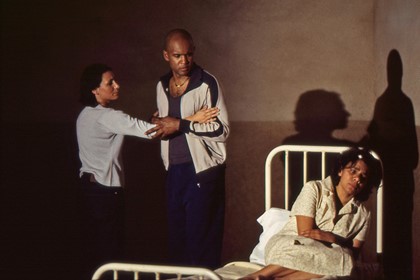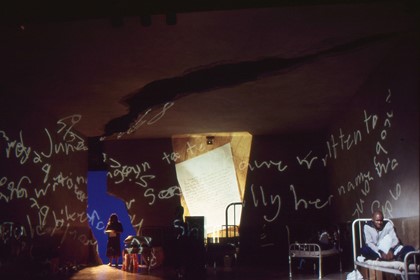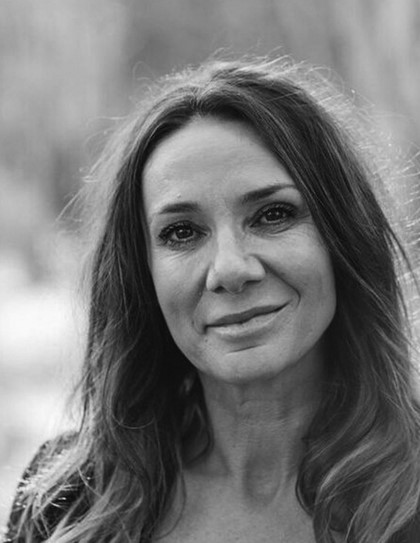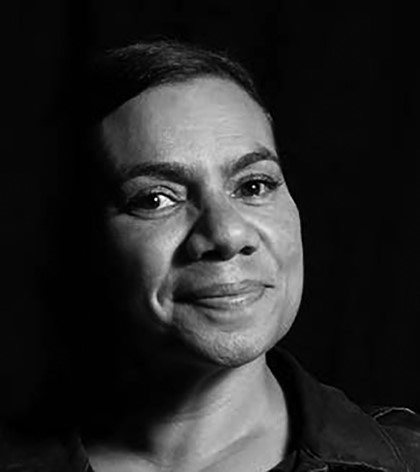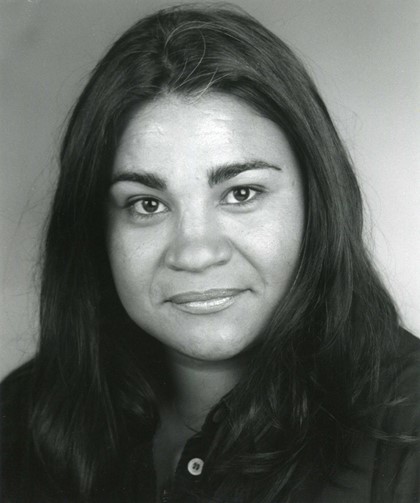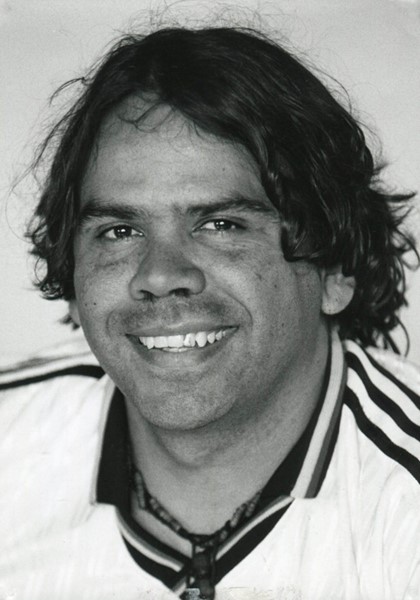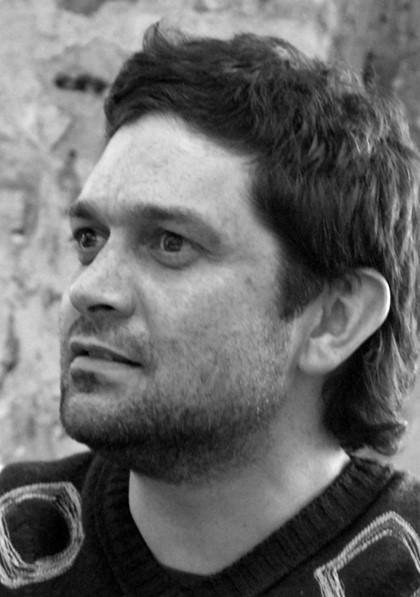Malthouse Theatre has a long history of engaging with contemporary Australian issues and hot button topics, seeking to reflect society as it is, both good and bad, provoking reflection and debate and challenging the audience in their seats. As Rob Reid writes, arguably the most impactful and important examples of this is their partnership with the Aboriginal and Torres Strait Islander theatre collective, Ilbijerri, for the production of Jane Harrison’s landmark work, Stolen.
Australia’s relationship with and treatment of Aboriginal and Torres Strait Island people over the years since colonisation is a continuing blight on our identity. For a long time, the country’s history of border wars, assimilationist and segregationist policies, and attempted genocides remained hidden to or wilfully ignored by the broad population of settler communities.
Among the most egregious of these histories is the Australian government’s policy of forced separation of Aboriginal children, especially those of mixed descent, from their families and communities, pursued in an official capacity in the decades between 1910 and 1970, but present in one way or another from the earliest days of colonisation. Children removed from their homes were discouraged from contact with their families, and taught to reject their identity. They were banned from practicing culture and speaking language, experienced harsh institutional conditions, suffered excessive physical punishment, and were exposed to physical and sexual abuse and racism. These policies and actions resulted in generations of trauma and destruction in Aboriginal communities, and the effects of them are still being felt today.
It wasn’t until 1995, when the Federal Attorney General established a national inquiry to be conducted by the Human Rights and Equal Opportunities Commission into these shameful chapters in Australian history, that broader recognition of these issues began to emerge. This inquiry would ultimately result in the submission of the Bringing Them Home report, which detailed the damage done by this appalling practice.
An important part of the movement towards this recognition was the production of Jane Harrison’s Stolen, presented in the Beckett Theatre as part of the Melbourne Festival in 1998. Originally conceived by Ilbijerri in 1992 to be their second production, following John Harding’s successful Up the Road in 1991, Stolen (or as it was known then The Lost Children), was intended to be a production for the community, addressing the terrible legacy of the Forced Separation policies.
As a collective, Ilbijerri was formed in 1991 out of a frustration with the lack of opportunities for Indigenous performers and theatre makers in Victoria. John Harding, one of the founding members, remembers that 'At that time there was very little happening for Indigenous Actors, nor were there many opportunities for Indigenous writers and we decided to take our future into our own hands and create our own company. There may have been the odd role, for example, an MTC production may need an Indigenous actor. However, often these roles were simply tokenistic. The only Indigenous plays we saw being performed in Victoria were coming from Western Australia, playwrights such as Jack Davis and Richard Whalley, Jimmy Chi from Broome.'ᶦ
After its first production the collective settled on the issue of the stolen children for its next work and placed an add in The Age newspaper, calling for submissions for a writer and researcher to develop a script. This caught the eye of Jane Harrison, at the time a commercial copy writer, the only Koori writer to apply for the position. Harrison recalls that 'By the time I had been told I’d got the gig, I’d got a full time job and didn’t have the time needed to do the research. Also, I did not have a lot of contacts in the Indigenous community. Antoinette Braybrook … did most of the research. She had the contacts and was able to introduce people to me. She’d feed the primary research to me, then we’d get together with either committee members or actors, people who would give feedback on the scenes that I was developing.'ᶦᶦ
The initial script was given a script development workshop, with funds provided by the Reichstein Foundation, and in September 1993 four public readings of the work were presented as part of the Melbourne Fringe Festival with support from Aboriginal Affairs Victoria. The cast for this were Dennis Fisher, Aunty Iris Lovett-Gardiner, Jimi Peters and Linda Rowlands and it was directed by Wesley Enoch. There then followed several years of development workshops and readings, working with a broad range of directors including Maryanne Sam, Andrea James and Noel Tovey, with dramaturgy by Fiona McHugh and Patricia Cornelius.
In early 1997, Playbox agreed to present the production, now officially known as Stolen, as part of their 1998 program, premiering it in the 1998 Melbourne Festival. Playbox Artistic Director at the time, Aubrey Mellor, recalls 'I had the privilege of working with the late, great Bob Maza in the 1970s when he founded the Black Theatre in Sydney and I witnessed some early Aboriginal plays and productions. Later, as Artistic Director of Queensland Theatre Company, I commissioned and produced some works with Indigenous artists. However, it wasn’t until I took up this position at Playbox that I actively set about establishing more thorough ways of supporting indigenous theatre.
For over 200 years the Indigenous voice has been devalued, even silenced. On stage it is still well overdue to be heard.'ᶦᶦᶦ
In 1997, then president of the Ilbijerri collective, Bev Murray, told reporters 'The stolen generations became one of the most talked about national issues this year and although the Victorian Government gave its own apology, everyone agrees that much work still needs to be carried out on this issue, in particular addressing the recommendations from the Bringing Them Home.'ᶦᵛ
The 1997 Olympic Festival of the Dreaming had presented Leah Purcell’s Box the Pony and Deborah Cheetham’s White Baptist ABBA Fan, and these two productions returned at the Arts Centre alongside the mainstage premier of Stolen at Playbox, as part of the 1998 Melbourne Festival. Sue Nattrass, director of the 1998 festival told interviewers 'They are all personal stories and people want to know what has happened. There is also a real positive feeling about reconciliation.'ᵛ
The cast for the original Playbox production of Stolen was Tammy Anderson, Kylie Belling, Tony Briggs, Pauline Whyman and Stan Yarramunua, and was once again directed by Wesley Enoch. Enoch describes the collaborative nature of the development and rehearsal process, 'In rehearsal I changed the sequence of the scenes and we cut some scenes. We changed some of the language so that it would be appropriate for this particular group of performers… The connection between the performers is really important. Each time the play is performed with different cast members it sheds a new light on the show and highlights a different perspective.'ᵛᶦ
Critics at the time were largely full of praise for the production’s aims, though not universally agreed about the dramatic realization of the project. Rob Gravestocks wrote that 'The beauty of the writing in Stolen is that at the start everything is all fluffy and light, with the performers playing barefoot kids, singing and playing. Through the course of the piece, the mood turns, and by the end the audience feels as if it has been punched in the stomach.ᵛᶦᶦ Veronica Matheson noted that 'the most touching moment comes at the close when the cast … relate individual connections to the powerful story. They reveal enough material for another drama…'ᵛᶦᶦᶦ and Jason Steger commented that 'This is an important work for Australia. Not an apportioning of blame, rather a deftly realized dramatization of a shamefully cruel past and a plea for a brighter future.'ᶦˣ
At the same time however, Lee Christofis declared, that 'Director Wesley Enoch generates momentum in this uneven work and its cumulative power, both distressing and shaming, has plenty of room to grow.'ˣ There’s also some anxiety expressed in the arts media about a perceived focus on worthiness over artistic excellence displayed in the 1998 Melbourne Festival programming. Chris Boyd wrote 'Affirmative action in the arts is fraught with dangers. But the bottom line is that celebrating 'near enough' as good enough' (or worse still, as 'excellent', which is the key word in all major arts festivals) is downright patronizing. Affirmative action also tends to alienate the ticket buying public,'ˣᶦ and Fiona Scott Norman noted that 'this festival never really shook off the sense that it was worthy and well-meaning rather than fun and exciting. There were so many shows that wagged a finger at the audience, that made a statement on or a comment about being Aboriginal, a woman, young and disposed, or old and still an important part of society. The migration thing was done to death; one more suitcase on stage and I would have throttled someone.ˣᶦᶦ It must be said however that both Boyd and Scott Norman, praised Stolen itself as the stand out production, Boyd calling it 'a simple but profoundly moving play'ˣᶦᶦᶦ and Scott Norman describing it as 'inventive, profoundly moving and brave.'ˣᶦᵛ
Though the response of critics was broadly very positive it would be disingenuous to say that audiences responded uniformly with the same positivity. Though anecdotally the production was greeted by hushed respectful silences, rapturous applause and people openly weeping in their seats, there were also attendant incidents of open and overt racism amongst some audiences. Amongst these were the theft of a 'Sorry' book from the foyer of the Malthouse, which had been provided for audiences to express the depth of their feelings of support for the project as well as sorrow and apology for the generations of damage caused by Australia’s treatment of Indigenous populations. Though there were many Sorry books filled and collected over the season, eventually to be presented to the Sorry Day working party, the stolen Sorry book was never recovered. The theatre and box office staff received several threatening phone calls and, during the return of the production for a school’s audience in 2005, incidents of students calling out racist comments during the show caused hurt and outrage among the staff, cast and crew and the wider community. These reactions from a vocal minority, however, were possibly to have been expected as race relations in Australia were far from settled, typified by then Prime Minister John Howard’s refusal to offer an apology on behalf of the country for the policies and practices that lead to the Stolen Generations. Indeed, it would be a further nine years before such an apology was offered by the government of Prime Minister Kevin Rudd.
Kate Herbert notes in her review that 'As a whitefella, it’s easy to remain at arm’s length from the stolen children of the Aboriginal nation, easy to say 'sorry' and to want reconciliation. But actually being one of the stolen generation must be incomprehensibly hard.”ˣᵛ Cast members Tony Briggs explained that 'Its’ impossible to write about the stolen generation if you know nothing about it. It’s impossible to write about being a black person, from any country, if you are not,'ˣᵛᶦ and Stan Yarramurua, who was also performing tradition dance ceremonies at the time, told a reporter a story of a foyer encounter in which, 'These two intelligent people from America were watching our dancing last night… afterwards one says to me 'were you cold out there?' I said yes. He said, 'Do you wear clothes?' I said Yes. He said 'Do you have a license?' I said yes. He said to the other American, 'See, I told you they were human.'ˣᵛᶦᶦ
Wesley Enoch perhaps sums the difficulties facing these communities in achieving true reconciliation when he told reporters, 'I’m not trying to be bleak, but with the sorts of abuses that are still happening, we haven’t changed that much … We might want reconciliation really badly, but it can’t happen until we’ve earnt it…. Having gone on a really long and emotional journey, people want a happy ending…. But how can we write that in when we haven’t’ got there ourselves? It’s only now that we are telling and feeling with these stories, so future generations can go the next step. Maybe it will … take us another couple of hundred years before we don’t feel bitter or guilty or angry – and can further build the character of this country.'ˣᵛᶦᶦᶦ
Nevertheless, Stolen has gone on to become a central work of the Australian theatre canon. Since its premier in 1998, it has around Australia and internationally, as part of the Heads Up Festival in the UK, which showcased a selection of Australian productions, being presented at the Tricycle Theatre in the UK. This was followed by a season at the Hong Kong Fringe Festival and the following year again toured to the UK, including Worcester, Leeds, Liverpool, Manchester, Coventry, London and Belfast. It has also been staged in Western Australia, performed Western Australian Academy of Performing Arts Aboriginal Certificate Students in 2005 and was presented as recently at 2011, at the Cremorne theatre in Queensland by students from Aboriginal Centre for the Performing Arts.
Although Stolen deals with a long dark chapter of Australian history, it is not inherently an accusatory polemic. Harrison says of the process she undertook to write it that in 'Talking to people who had been through these experiences, something that was pretty profound for me, was their lack of bitterness, an acceptance of what they’d suffered. I thought that was pretty incredible, and I wanted to mirror that stoicism in the script. There’s not a lot of blaming in the production and I think it is stronger for that. Indigenous people are pretty darn resilient; they use humour and they have a strong sense of family and community. These things haven’t been crushed out of Aboriginal people. That sense of hope that a lot of people have, no matter what they’ve experienced.'ˣᶦˣ
Stolen is a testament to the power of theatre to tell the community profound and difficult truths about itself. Ultimately it is a celebration of survival in the face of unbearable adversity. As Enoch puts it, 'If these stories aren’t told, you feel you will collapse under the burden of them. You really have to share them – no matter how painful they are.'ˣˣ
Citations & References
ᶦ Steven, Margaret and Upton, Meg. “Interview with John Harding”, Stolen Background Notes, complied by Margaret Steven and Meg Upton, Education Officers, for Playbox Theatre CO and Ilbijerri Aboriginal and Torres Strait Islander Theatre Co-op, Ltd, 2002.
ᶦᶦ Steven, Margaret and Upton, Meg. “Interview with Jane Harrison”, Stolen Background Notes, complied by Margaret Steven and Meg Upton, Education Officers, for Playbox Theatre CO and Ilbijerri Aboriginal and Torres Strait Islander Theatre Co-op, Ltd, 2002.
ᶦᶦᶦ Steven, Margaret and Upton, Meg. “Interview with Aubrey Mellor”, Stolen Background Notes, complied by Margaret Steven and Meg Upton, Education Officers, for Playbox Theatre CO and Ilbijerri Aboriginal and Torres Strait Islander Theatre Co-op, Ltd, 2002.
ᶦᵛ No Author. “On Track for Stolen”, The Koori Mail, 5 November 1997.
ᵛ Usher, Robin. “Opening the way to Unity”, The Age, Artsbeat, 13 October 1998.
ᵛᶦ Steven, Margaret and Upton, Meg., Op. Cit.
ᵛᶦᶦ Gravestocks, Rob. “Then there were Five”, The Melbourne Times, 4 November 1998.
ᵛᶦᶦᶦ Matheson, Veronica. “Stolen (Malthouse theatre)”, Herald Sun, 1 November 1998.
ᶦˣ Steger, Jason. “Review: Stolen”, The Sunday Age, Applause, 25 October 1998.
ˣ Christofis, Lee. “Critics choice”, The Australian, 30 October 1998.
ˣᶦ Boyd, Chris. “Acting Up”, The Big Issue 1998 Melbourne Festival, 30 Nov – 14 Dec 1998.
ˣᶦᶦ Scott-Norman, Fiona. “Next Time, Let it Grow”, The Bulletin, Festivals, 17 November 1998.
ˣᶦᶦᶦ Boyd, Chris. Op. Cit.
ˣᶦᵛ Scott-Norman, Fiona. Op. Cit.
ˣᵛ Herbert, Kate. “Tears for Broken Lives”, Herald Sun, 28 October 1998.
ˣᵛᶦ Barclay, Alison. “Speaking of Greif”, Herald Sun, Arts and Entertainment, 20 October 1998.
ˣᵛᶦᶦ Ibid.
ˣᵛᶦᶦᶦ Schubert, Misha. “PM promises but this plays for keeps”, The Weekend Australian, 17 – 18 October 1998.
ˣᶦˣ Steven, Margaret and Upton, Meg. Op. Cit.
ˣˣ Steven, Margaret and Upton, Meg. Op. Cit.
